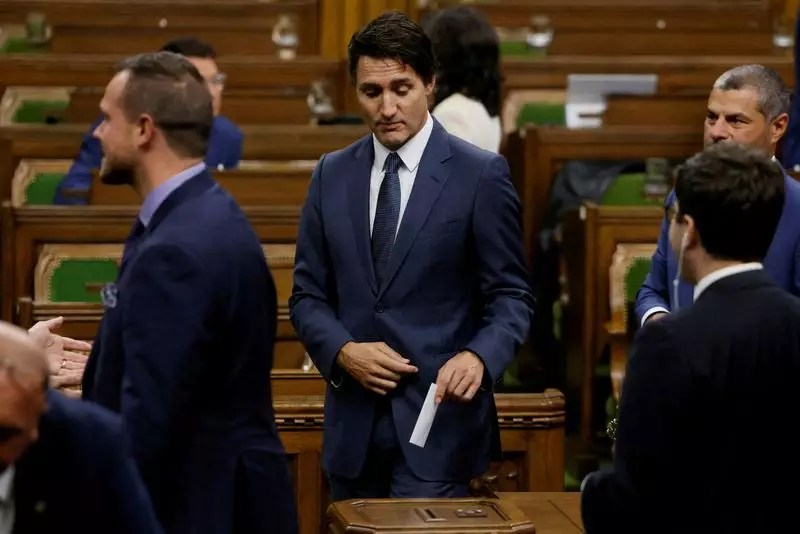The political climate in Canada is undergoing a significant transformation as Prime Minister Justin Trudeau’s Liberal Party finds itself grappling with a precarious election scenario in the Montreal riding of LaSalle–Émard–Verdun. Historically considered a Liberal stronghold, the outcome of this special election carries weighty implications not only for the party’s immediate future but also for Trudeau’s leadership. Polls indicate a seismic shift, suggesting that the Liberals are trailing and that the Conservative Party, led by Pierre Poilievre, is gaining ground at an alarming pace.
The special election was necessitated by the resignation of a Liberal legislator, which ordinarily would provide the ruling party with a conducive environment to secure yet another victory in familiar territory. However, the current political landscape reveals a startling reality: surveys suggest that the race has narrowed far more than previously anticipated, raising alarm bells within Liberal circles. Should the party fail to retain this seat, it would likely exacerbate calls for a leadership change and put Trudeau’s political future in serious jeopardy.
Trudeau’s leadership has recently come under intense scrutiny, a fact underscored by the open dissent from some of his own legislators. Alexandra Mendes, a fellow Liberal representative, brought to light the dissatisfaction of her constituents, many of whom feel that Trudeau is no longer the right fit to lead. Her remarks reflect a growing concern among party members regarding Trudeau’s capacity to connect with voters and address their pressing issues. The chorus of dissenting voices within the party presents a twist in the narrative; perhaps indications of a potential fracture in Liberal support as the party approaches a critical juncture.
The Prime Minister himself has insisted that he intends to lead the party through to the next federal election scheduled for late 2025. Nonetheless, with mounting frustrations about the cost of living coupled with a pervasive housing crisis, the complexity of Trudeau’s situation becomes ever more daunting. He acknowledged these challenges in a recent statement, recognizing the pervasive frustration among Canadians. The increasing dissatisfaction with his government, especially regarding economic conditions, suggests that the Prime Minister’s hold on power is becoming increasingly tenuous.
Amid this turmoil, the Conservative Party appears ready to capitalize on the Liberal Party’s vulnerabilities. Recent polling data paints a foreboding picture for the Liberals, with the Conservatives enjoying unprecedented levels of public support; reaching 45%, they are positioned far ahead of the Liberals, who stand at 25%. This trend is not just a matter of statistical significance but represents a possible reorientation of the political landscape in Canada, potentially heralding a period of Conservative dominance.
Pierre Poilievre’s tactics as an opposition leader have been notably aggressive. By proposing to eliminate a federal carbon tax and advocating for stricter immigration measures, he is arguably aligning himself with voter sentiments frustrated by financial constraints. Critics have pointed out that his positions resemble strategies utilized by populist movements, raising concerns over the ideological implications of voting for a party that appears to echo sentiments associated with former President Donald Trump’s agenda in the United States.
As the situation grows critical for the Liberals, their defensive strategy is beginning to crystallize. Party officials have indicated an intention to portray Poilievre as a figure aligned with extreme right ideologies. By framing the Conservative leader in this light, the Liberals aim to recapture the voter base that may distrust the far-right label more than they are dissatisfied with the current government.
However, this strategy is fraught with complications. Attempting to alienate the opposition while simultaneously addressing their own leadership crisis can prove to be a double-edged sword. The prospect of losing a historically safe seat like LaSalle–Émard–Verdun could very well unravel the already fraying threads of support for Trudeau’s premiership.
The upcoming election serves as a litmus test for Trudeau and his government. A loss would not merely indicate a drop in public favor but could instigate an urgent reassessment of party leadership, strategies, and core values as they grapple with a rapidly shifting political landscape marked by declining popularity and rising opposition. With the political stakes higher than ever, the future of Canada’s Liberal Party remains uncertain as the reality of electoral challenges looms large.


Leave a Reply